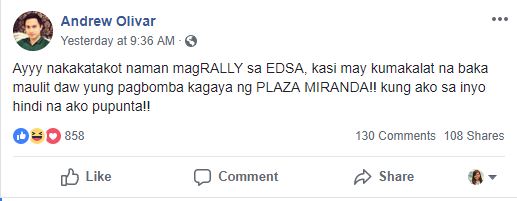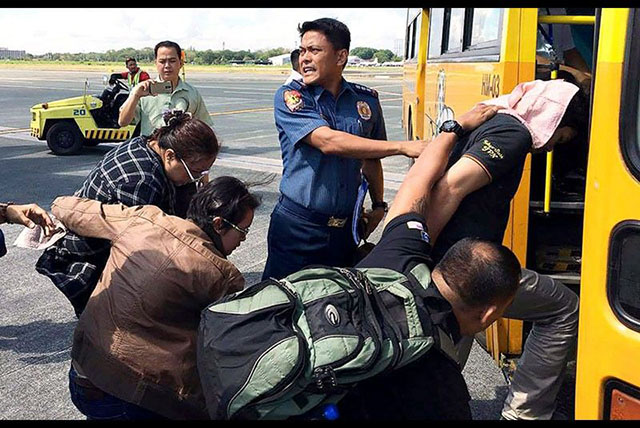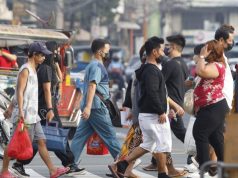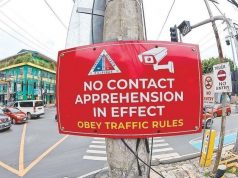
Filipinos were not amused when blogger Andrew Olivar shared that there might be a bombing on EDSA on the day the country commemorates the 46th anniversary of the declaration of Martial Law.
He referenced the Plaza Miranda bombing that happened in Quiapo, Manila in 1971 on his Facebook status and quipped that it’s “scary” to attend a rally on EDSA, a major thoroughfare in Metro Manila, on September 21.

His status was met with ire and criticisms from Filipinos who quickly pointed out that making bomb jokes is illegal.
One Facebook user wrote, “Threat ito, Drew Olivar, pwede kang kasuhan dito. Napakashunga mo talaga bakla.”
Another user wrote, “Nako, nako. Nagbabanta ‘to. Screenshot na ang message. Malinaw na ebidensya ‘yan.”
Someone even tagged the Philippine National Police’s Facebook page to alert them of Olivar’s status.
“Hey Philippine National Police, someone is spreading unsubstantiated bomb threat in Facebook, I’m pretty sure that it is against the law to do that as it will create panic,” the user wrote.
Olivar was previously involved in a controversial video that featured him and PCOO assistant secretary Mocha Uson, where they made fun of the sign language used by the deaf community.
Making bomb allegations is against the law
According to Presidential Decree No. 1727 (series 1980), it is unlawful to spread false information that concerns bombs, explosives or any other similar device or means of destruction.
The decree states that anyone who willfully makes any threat or disseminates false information “to damage or destroy any building, vehicle, or other real or personal property, by means of explosives, incendiary devices, and other destructive forces of similar nature” is punishable by law.
It is applicable to any means of communication, be it through word of mouth, mail, telephone, telegraph, printed materials or any other similar means.

People caught violating the law will be imprisoned for a maximum of five years or be fined for up to P40,000.
The decree is also known as the “Anti-Bomb Joke Law.” It is strictly implemented in public places and airports to give travelers and the public a sense of security.
Recalling what happened in Plaza Miranda
Various political events were held at Plaza Miranda. Its bombing in Aug. 21, 1971 was believed to have been a precursor towards the imposition of Martial Law by ex-President Ferdinand Marcos.
On that fateful day, members of the Liberal Party spearheaded by Gerardo Roxas held their meeting de avance at the Plaza.
Eight senatorial bets that belonged to the party delivered their respective speeches for the electoral campaign when two grenades were hurled towards the stage.
The incident became known as the “Plaza Miranda bombing.” It wounded around 100 people, including senatorial bets. It also killed nine people, including Manila Times photographer Ben Roxas and a five-year-old.
Communist Party of the Philippines founder Jose Maria “Joma” Sison was believed to have planned the bombing. — Artwork by Uela Altar-Badayos; Photo from Andrew Olivar via Facebook









